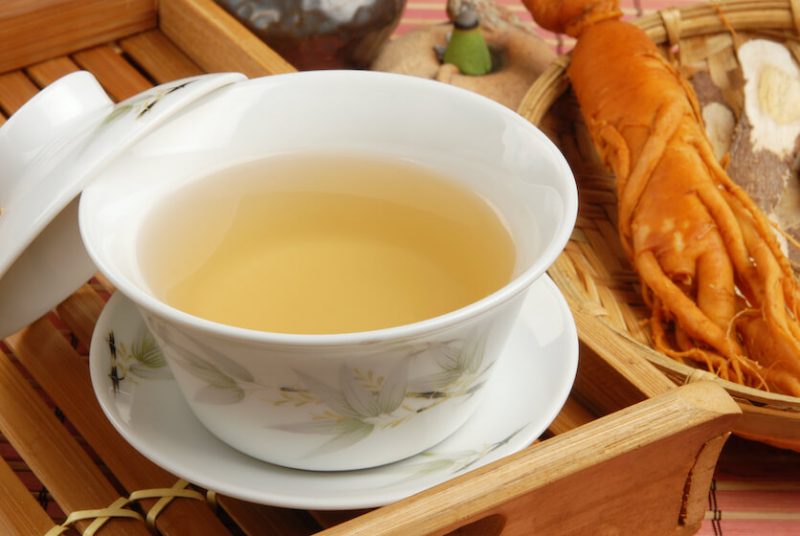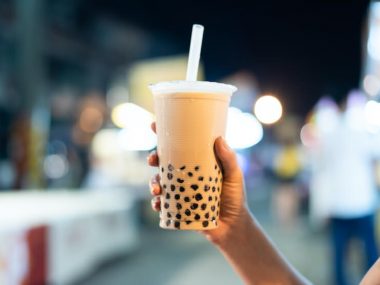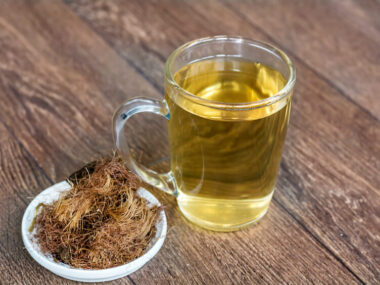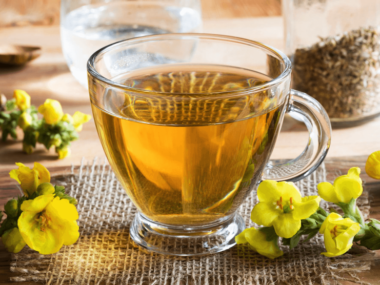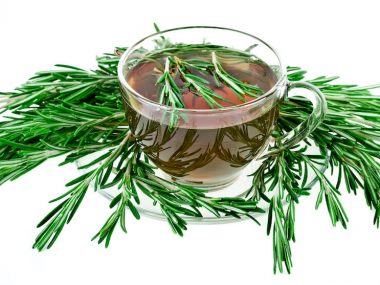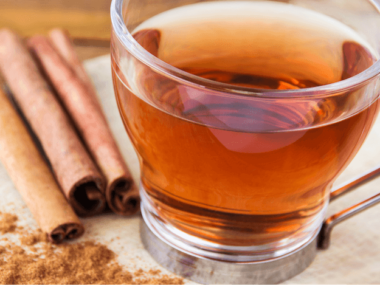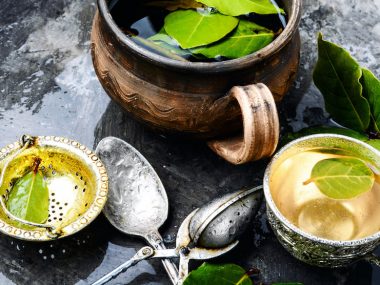We’ve got a tea for you made from an Appalachian hot commodity called ‘sang, which can cool the body while its Korean counterpart could set you on fire. We’re going to dig up some serious dirt to expose a “rooted” wonder herb! Ginseng tea is a uniquely flavored drink you must try at least once!
Table of Contents
What Is Ginseng?
Ginseng is an herbaceous plant (Panax) that grows wild and is also cultivated. There are several species of ginseng. However, the two most common species harvested for herbal purposes are Panax ginseng (Korean ginseng) and Panax quinquefolius (American ginseng).
Korean ginseng is often referred to by other names such as “Chinese ginseng” or “Asian ginseng.” Here in the U.S., ginseng is referred to as ‘sang. The two species not only have different flavors but also differ in strength.
The roots of the ginseng plant are the part of the plant used to produce the herb which is used in teas, tinctures, and the herbal supplement industry. The roots are harvested and marketed whole, dehydrated slices or bits, or as a powder.
What Does Ginseng Tea Taste Like?
A ginseng tea flavor depends on which ginseng species is used to make the tea. Asian ginseng is bitter with a kick of heat, whereas American ginseng is bitter with a cooling sensation. Regardless of the ginseng species used for tea, there is a common earthy, sharp overtone. To make ginseng tea more palatable, honey and lemon are added.
History Behind Ginseng
Ginseng has been around for thousands of years and is a common herb used in traditional medicine. The traditional medicine community claims ginseng is therapeutic for heart conditions, memory, immunity, and overall vigor.
Korean Ginseng
Korean ginseng (Panax ginseng) is said to be the original ginseng which was said to have originated back in the Han Dynasty period (1st Century B.C.) However, it was later discovered that Chinese ginseng’s origins lie within Korea and Manchuria. The proper reference for Panax ginseng is “Korean ginseng,” but you’ll hear many people call it “Chinese ginseng.”
Although Korean ginseng is the most common ginseng marketed globally, other ginseng species are cultivated and harvested locally, such as American ginseng.
American Ginseng
Pennsylvania State University Extension’s research on the history and cultivation of ginseng revealed that American ginseng (Panax quinquefolius), which is grown here in the U.S., is a highly sought-after herb. American ginseng grows wild throughout wooded areas in the eastern half of the U.S. In fact, in the 1700s, American frontiersman Daniel Boone was known for hunting wild-growing ginseng in the Appalachians, which he sold to suppliers.
The 1700s were also a time when Cherokees hunted ginseng because they used it to treat numerous ailments. For every fourth ginseng plant they dug up, they replaced it with a replacement seed to keep the supply going. By 1750 the Cherokees traded ginseng in Virginia and South Carolina’s seaports. This ginseng was shipped to China, whose ginseng supply was dwindling.
Today, American ginseng is poached because of how valuable it is. The Convention on International Trade in Endangered Species controls harvesting within each state in the U.S. where it grows wild or is cultivated.
Different Types Of Tea With Ginseng
There aren’t different “types” of ginseng tea, but rather variations of how ginseng tea is made. Because an unadulterated ginseng tea is not pleasant and harsh to the palate, other things are added or blended in to make it better tasting.
Variations Of Ginseng Tea
- Unadulterated American Ginseng Tea
- Unadulterated Korean Ginseng Tea
- Lemongrass Ginseng Tea
- Green Tea with Ginseng and Honey Tea
- Ginger and Ginseng Tea
- Oolong and Ginseng Tea
- Guava, Ashwagandha, and Ginseng Tea
- Mango, Pineapple, and Ginseng Tea
Is Ginseng Tea Better Than Green Tea?
We have laid out ginseng and green tea side-by-side to provide a view of their differences. As far as deciding which is better, that comes down to a personal choice. Tea drinkers who prefer tisanes (herbal tea) as a caffeine alternative will most likely opt for ginseng. Likewise, those seeking a true tea’s health benefits will likely opt for green tea.
Ginseng Tea | Green Tea |
Flavor: bitter, sharp, spicy, or cooling (depending on species,) unpleasant | Flavor: earthy, sweet, mild, subtle hints of floral, or nutty |
Caffeine: none | Caffeine: up to 70 mg per six-ounce cup |
Beneficial constituent: ginsenosides | Beneficial constituents: Phenols and flavonoids |
| Health Benefits: According to the Journal of Ginseng Research, ginseng is a vasorelaxant, antioxidant, and anti-inflammatory. Additionally, ginseng is adaptogenic (also known as a “fix-all” herb.) | Health Benefits: According to “Chinese Medicine Beneficial Effects of Green Tea: A Literature Review,” green tea has proven benefits,” green tea is an immune booster, promotes healthy bones, inhibits viruses and infections, and reduces chronic conditions. |
How Much Caffeine Is In Ginseng Tea?
Ginseng tea is a tisane (herbal tea). Tisanes are caffeine-free. True teas (black, green, oolong, yellow, white) are made from the tea plant (Camellia sinensis), which has naturally occurring caffeine. Herbal teas (tisanes) are made from parts of other plants such as leaves, flowers, stems, or roots. Ginseng is made from the root of Panax ginseng (Korean ginseng) or Panax quinquefolius (American ginseng.) Ginseng tea with a blend of true tea (such as green or oolong) can contain up to 70 mg of caffeine in a six-ounce cup. It’s not the ginseng that has caffeine but the true tea.
Is It Ok To Drink Ginseng Tea Every Day?
When it comes to tea, we do not have the expertise to offer medical advice or recommendations. Those with medical conditions, taking medications, or with allergies should especially consult with their healthcare provider before consuming tea or ingesting any herb.
Some herbs (and true teas) can cause adverse reactions, side effects, worsen existing medical conditions, or interact with radiation, chemotherapy, or medications.
“Asian” ginseng is relatively safe for most people (excluding children, pregnant, and nursing mothers) if used short-term (6 months or less.)
The National Center for Complementary and Integrative Health
Ginseng Tea Benefits
Ginseng is one of the most valued herbs in Asia and in Chinese/Traditional medicine. Claims of ginseng being a “treat all” adaptogenic herb has been validated in a published research article entitled “Adaptogenic effects of Panax ginseng on modulation of cardiovascular functions.” Perhaps ginseng’s universal ailment relief is why it’s been used for thousands of years.
What Is Ginseng Tea Good For?
As an adaptogenic, ginseng may provide an overall sense of well-being. The constituent ginsenoside, which is present in ginseng, is said to have numerous pharmacologic effects.
According to “Adaptogenic effects of Panax ginseng on modulation of cardiovascular functions,” ginseng is only as good as its cultivation. If harvested too young or at the wrong time, it may lack effectiveness. Even if it’s grown in the best conditions and undergoes the right time of harvest, post-harvest processing can ruin it.
The overall quality and protection of ginseng’s benefits rely on several things:
- Species of ginseng
- The age of the ginseng at harvest time
- Which part of the plant is harvested
- How it is cultivated
- When it is harvested
- How it is processed and preserved
Providing all of the above key points are carefully followed, ginseng can enable the body to:
- Have a more optimized metabolic system
- Experience an overall balance in physiological systems
- Be better equipped to handle stressors biologically and emotionally
- Have a better sense of well-being
So, in essence, ginseng enables our body and mind to adjust and self-regulate without us knowing it!
Why Is Ginseng Tea Bad For You?
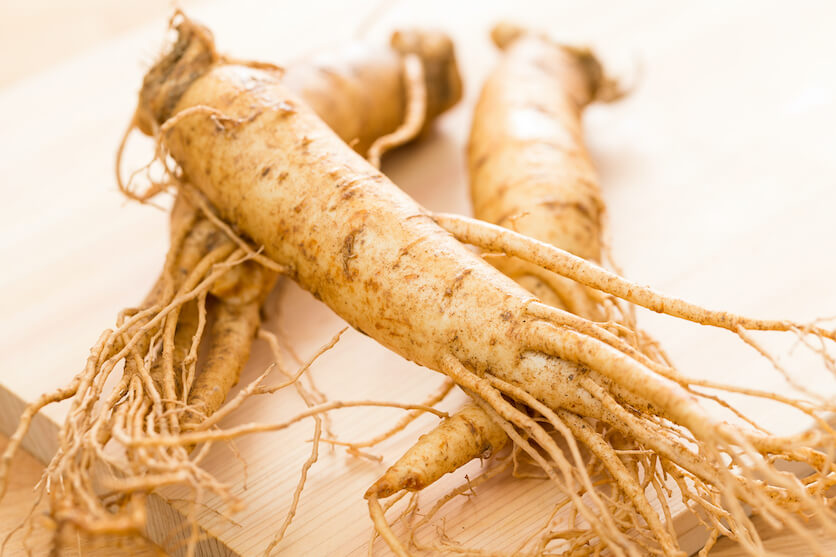
Unfortunately, we have to include the bad with the good. Herbs may have excellent benefits, but they may also come with a bit of unwanted extra baggage known as side effects, adverse reactions, or interactions.
The Journal of Ginseng Research mentions possible side effects and adverse reactions associated with the consumption of ginseng.
- Insomnia
- Diarrhea
- Skin irritation
- High or low blood pressure
- Edema
- Decreased appetite
- Depression
- Nervousness
- Headache
- Digestive upset
- Irregular menses
- Vomiting
Potential Adverse Reactions
(Associated with high dose/long-term usage of ginseng)
- Affective disorder
- Anaphylactic shock
- Cardiovascular/renal toxicity
- Genital organ bleeding
- Gynecomastia (in men)
- Reproductive toxicity
- Combining ginseng with other herbs/ingredients can cause serious and even fatal events.
- Blood sugar event
- Birth defects
- Liver inflammation
Drug/Herb Interactions
National Capital Poison Control mentions that ginseng may have possible interactions with some medications.
- Anti-hypertensives
- Anti-coagulants
- Antidepressants
- Statins
- Calcium channel blockers
- Ephedra
- Antidiabetics
- Immunosuppressants
- Bitter mallow
- Bitter orange
How To Make Ginseng Tea
Making ginseng tea is fairly straightforward. The key to a safe and good-quality ginseng tea is getting your ginseng root from a reliable, ethical source. A good place to start is a dedicated ginseng grower. Digging up your own or buying it from a backyard gardener or herbalist is not recommended.
Keep in mind that Korean ginseng has a completely different flavor than American ginseng.
Ingredients:
- 4 cups of water
- 8 grams of sliced ginseng root
- Honey to sweet as desired
Directions:
- Place the water into a pan and bring to a boil.
- Remove from the heat.
- Add the ginseng root to the water.
- Cover and allow to steep for 15 minutes.
- Strain the tea into a teacup.
- Add honey to sweeten and enjoy.
Ginseng Tea: A Yes Or No?
The evidence-backed data provides you an idea of what to expect with ginseng; however, further studies are required as it is still being closely examined by researchers. Talk to your doctor so you will have peace of mind before consuming any tea. Once you do, each sip will be sweet and well-enjoyed!
